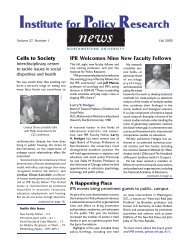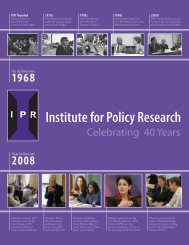pdf - Institute for Policy Research - Northwestern University
pdf - Institute for Policy Research - Northwestern University
pdf - Institute for Policy Research - Northwestern University
You also want an ePaper? Increase the reach of your titles
YUMPU automatically turns print PDFs into web optimized ePapers that Google loves.
Urban <strong>Policy</strong> and Poverty<br />
At the March 10 policy briefing on<br />
“Community Change in Chicago: How<br />
is the Landscape Shifting?” IPR faculty,<br />
political scientist Wesley G. Skogan,<br />
and sociologists Mary Pattillo and Juan<br />
Onésimo Sandoval, examined trends<br />
in housing, crime, and neighborhood<br />
diversity (<strong>for</strong> more in<strong>for</strong>mation see p. 4).<br />
Sociologist Juan Onésimo Sandoval is<br />
currently at work on a book manuscript<br />
titled “The Social Order of the American<br />
Metropolis: How Race and Class<br />
Have Restructured America’s Colorful<br />
Colorline.” It will trace patterns of racial<br />
and economic segregation prevalent in<br />
American cities.<br />
Sandoval continues to investigate the<br />
extent of ethnic and economic diversity<br />
in Asian and Latino populations. He has<br />
examined pan-Latino identity <strong>for</strong>mation<br />
and the diversity of pan-ethnic Latino<br />
enclaves in the U.S., and he conducted a<br />
comparative study of pan-ethnic Latino<br />
and Asian neighborhoods. He shows that<br />
pan-Asian enclaves tend to represent<br />
a very diverse pan-Asian population<br />
while Latino enclaves tend to be more<br />
homogeneous.<br />
Sandoval also explored inequality in<br />
neighborhood incomes <strong>for</strong> Chicago from<br />
1980 to 2000. While income disparities<br />
have declined in predominantly white<br />
neighborhoods, he found they are on<br />
the rise in black neighborhoods; racially<br />
integrated neighborhoods display a higher<br />
degree of income inequality; and income<br />
disparity is greater in urban centers than<br />
in the suburbs <strong>for</strong> all racial groups.<br />
Community Development<br />
From the poorest neighborhoods in<br />
Chicago to far-flung communities in<br />
Ireland, Rwanda, and Ethiopia, the Asset-<br />
Based Community Development (ABCD)<br />
<strong>Institute</strong> is teaching residents how to find<br />
and use local resources to rejuvenate their<br />
economies, strengthen public and private<br />
investments in community, and ultimately<br />
rebuild civil society. ABCD is co-directed<br />
by John McKnight and John Kretzmann.<br />
In Ethiopia, ABCD has been working<br />
with Oxfam Canada and the Coady<br />
International <strong>Institute</strong> on a three-year<br />
project that covers a variety of activities<br />
such as establishing women’s credit circles<br />
and rebuilding roads and wells <strong>for</strong> several<br />
villages. In Rwanda, the institute has<br />
partnered with religious organizations<br />
in Kigali on community<br />
development projects<br />
<strong>for</strong> building roads and<br />
creating jobs. Residents<br />
of the isolated Rwandan<br />
city of Mumbai decided<br />
to build a health clinic<br />
after reviewing their<br />
community assets.<br />
In Ireland, ABCD has<br />
Juan Onésimo Sandoval describes<br />
been involved in a Dublin changing patterns of segregation<br />
Docklands development<br />
and diversity in Chicago.<br />
project. The Docklands<br />
is a <strong>for</strong>mer dock area on the city’s east<br />
side. The project aims to develop this<br />
<strong>for</strong>merly depressed industrial area by<br />
2012 into a sustainable example of innercity<br />
regeneration, with af<strong>for</strong>dable housing,<br />
schools, and places to work and socialize.<br />
The institute is helping to ensure that the<br />
established working-class residents are<br />
not pushed aside during the revitalization<br />
process.<br />
ABCD worked with the Chicago Police<br />
Department to train 1,200 neighborhood<br />
representatives through the Community<br />
Policing Leadership Development<br />
<strong>Institute</strong> on neighborhood safety projects.<br />
Nationally, the institute has designed<br />
and helped to deliver community<br />
development training to thousands of<br />
AmeriCorps, Senior Corps, and VISTA<br />
leaders and volunteers.<br />
J. Reblando<br />
www.northwestern.edu/ipr 35
















